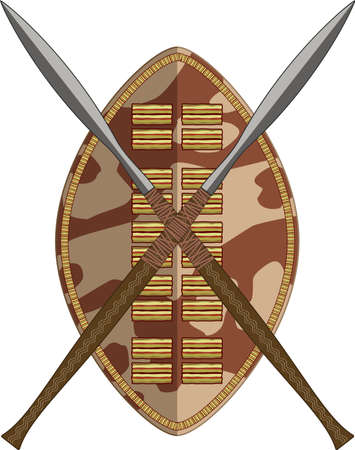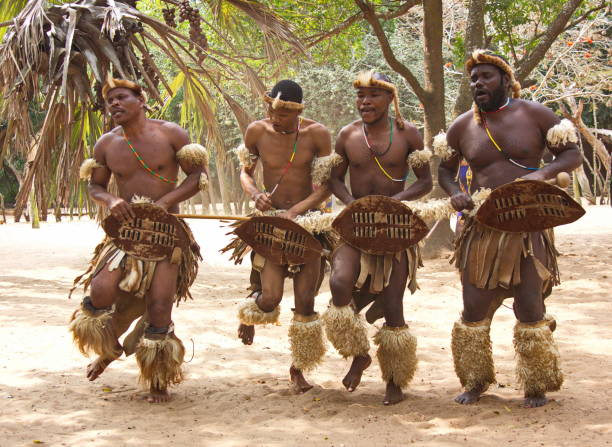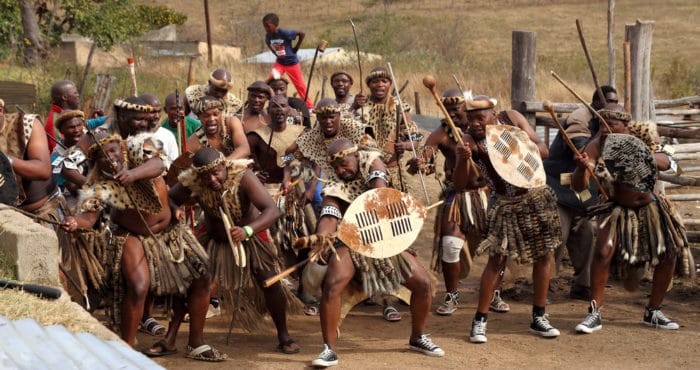Zulu People
・The Zulu are one of the largest ethnic groups in Southern Africa, primarily residing in South Africa.
・They are part of the Bantu linguistic and cultural family and are known for their rich heritage of warrior tradition, oral poetry and ceremonial dance.
・The name “Zulu” is derived from iZulu, meaning “heaven” or “sky.”
Location
・Mainly located in KwaZulu-Natal Province in South Africa.
・Also present in parts of Mozambique and Eswatini (Swaziland).
・Many Zulu have migrated to urban centers like Johannesburg and Durban.
History
・In the early 1800s, King Shaka Zulu united various Nguni clans into a powerful Zulu Kingdom.
・Shaka revolutionized military tactics and expanded the kingdom’s territory.
・The Anglo-Zulu War of 1879 featured both Zulu victories and eventual British colonization.
・Today, the Zulu monarchy remains a symbolic cultural institution within South Africa.
Culture
・Warrior Heritage:Spears (assegai), shields, and military regalia are symbolic.
・Traditional Dance (Indlamu):High-kicking dance performed at weddings, rituals, and festivals.
・Beadwork::Colorful bead patterns convey messages about age, marital status, and social ties.
・Ubuntu Philosophy:Emphasis on community, mutual respect, and ancestral connection.
Zulu Symbols and Flag

No official ethnic flag, but the Zulu Kingdom historically used
・Cowhide shields and assegai spears.
・Symbolic black-and-white patterns representing different Zulu regiments.
Modern symbols include
・Royal crests, Zulu traditional attire, and beadwork patterns.
Language
・Zulu language (isiZulu) is part of the Bantu family under the Niger-Congo language group.
・Spoken by over 12 million people in Southern Africa.
Features
・Incorporates click consonants influenced by Khoisan languages.
・Extensive noun class system.
・Intelligible to speakers of Xhosa, Swati, and other Nguni languages.
Common Zulu Greetings and Phrases
| English | Zulu (isiZulu) | Pronunciation |
| Hello | Sawubona | sah-woo-boh-nah |
|---|---|---|
| Good morning | Sawubona ekuseni | sah-woo-boh-nah eh-koo-seh-nee |
| Good night | Ulale kahle | oo-lah-leh kah-hleh |
| Thank you | Ngiyabonga | ngee-yah-bong-gah |
| Nice to meet you | Ngiyajabula ukukwazi | ngee-yah-jah-boo-lah oo-kook-wah-zee |
| Delicious | Kumnandi | koom-nahn-dee |
| Fun/Enjoyable | Kuyajabulisa | koo-yah-jah-boo-lee-sah |
Region
Continent:Africa
Access Guide
Zulu Region
The currency of the Zulu people is the South African Rand (ZAR).
Access to Zulu Region (Durban, South Africa) from Major Cities
| Departure City | Direct/Transit | Arrival Airport | Flight Time (approx.) | Reference Fare (one-way/round-trip, Economy) |
| Los Angeles | LA → Europe/Middle East → Johannesburg → Durban | King Shaka Int’l (DUR) | 24–34 hours | US$1,200–2,100 |
|---|---|---|---|---|
| New York | NY → Europe/Middle East → Johannesburg → Durban | King Shaka Int’l (DUR) | 21–32 hours | US$1,100–1,9000 |
| London | London → Johannesburg → Durban | King Shaka Int’l (DUR) | 16–20 hours | £750–1,300 |
| Tokyo | Tokyo → Middle East/Europe → Johannesburg → Durban | King Shaka Int’l (DUR) | 22–32 hours | ¥190,000–310,000 |
| Sydney | Sydney → Johannesburg → Durban | King Shaka Int’l (DUR) | 18–27 hours | A$1,600–2,800 |
| Hong Kong | Hong Kong → Johannesburg → Durban | King Shaka Int’l (DUR) | 20–28 hours | HK$8,800–15,000 |
| Shanghai | Shanghai → Johannesburg → Durban | King Shaka Int’l (DUR) | 21–29 hours | CNY7,800–13,500 |
| Singapore | Singapore → Johannesburg → Durban | King Shaka Int’l (DUR) | 19–27 hours | S$1,400–2,400 |
Language Origins
・Zulu evolved from Nguni dialects of the Bantu-speaking peoples.
・Influenced by Khoisan languages, especially in click sounds.
・Written Zulu began in the 1800s via missionary work and expanded through education and print.
Writing System
・Written using the Latin alphabet, formalized by Christian missionaries in the 19th century.
・Zulu is one of South Africa’s 11 official languages.
・Widely used in education, literature, media, and government.
Detailed Habitat
・KwaZulu-Natal is the heartland of Zulu culture.
・Large Zulu communities exist in
・Gauteng Province (urban centers like Johannesburg)
・Parts of Mpumalanga, Eastern Cape, and Free State.
Traditional Games of the Zulu People
1.Morabaraba
・A strategy board game similar to Nine Men’s Morris.
2.Stick Fighting (Induku)
・Cultural martial art used to train young men.
3.Bead Tossing Games
・Aiming games played by children using beads or pebbles.
4.Dance Battles
・High-energy dance competitions featuring stamping, kicks, and chants.
Introduction video


The Zulu people embody strength, rhythm, community, and storytelling—a living culture of dignity, pride, and vibrant expression.
